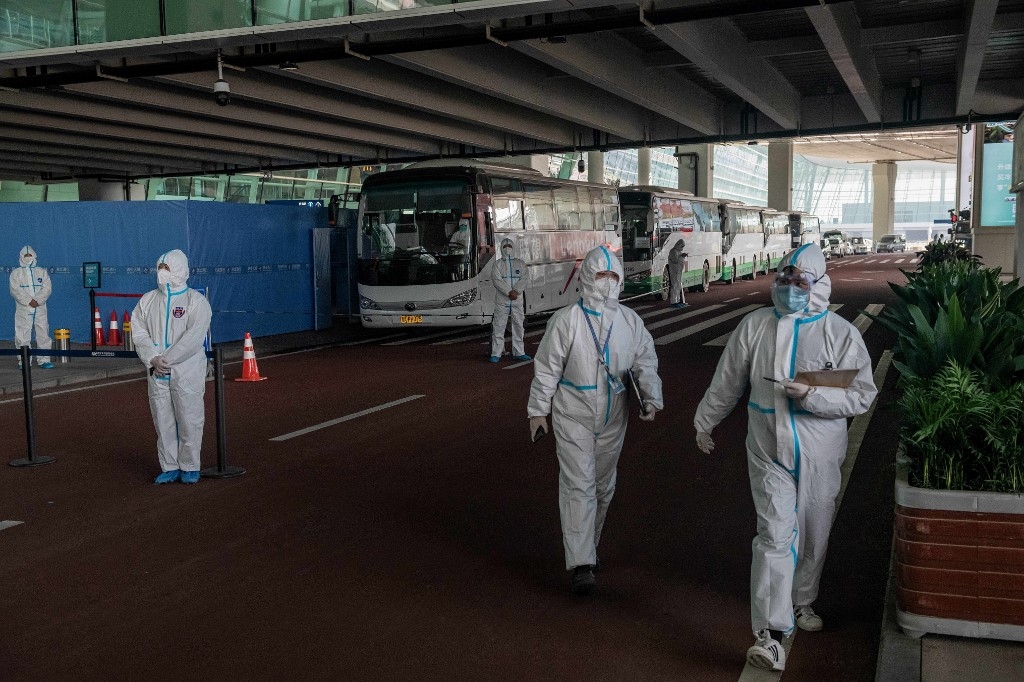WHO team arrives in Wuhan as China reports first virus death in months
 |
| Health workers in personal protection suits stand next to buses at a cordoned-off section at the international arrivals area, where arriving travellers are to be taken into quarantine, at the international airport in Wuhan on January 14, 2021, following the arrival of a World Health Organization (WHO) team investigating the origins of the Covid-19 pandemic.(NICOLAS ASFOURI / AFP) |
The 10 scientists, who must complete a two-week quarantine in Wuhan before starting their work, arrived for their much-delayed mission to examine the orgins of the pandemic.
The virus was first detected in the central Chinese city of Wuhan in late 2019 and has since billowed out across the world killing nearly two million people so far, infecting tens of millions and eviscerating the global economy.
State broadcaster CGTN showed the plane carrying the team arrive from Singapore to be met by Chinese officials in full hazmat suits.
Their trip comes as more than 20 million people are under lockdown in the north of China and one province has declared an emergency, with Covid-19 numbers climbing after several months of being relatively static.
China had largely brought the pandemic under control through strict lockdowns and mass testing, hailing its economic rebound as an indication of strong leadership by the Communist authorities.
But another 138 infections were reported by the National Health Commission on Thursday -- the highest single-day tally since March last year.
Clusters are still small compared with many countries contending with rampant infections and record numbers of deaths, and the first virus fatality in several months -- reported in northern Hebei province -- seeded alarm across China.
Beijing is anxious to stamp out local clusters ahead of next month's Lunar New Year festival when hundreds of millions of people will be on the move across the country.
Health authorities gave no details about the latest death except that it occurred in Hebei province, where the government has placed several cities under lockdown.
As infections have spread, northeastern Heilongjiang declared an "emergency state" on Wednesday, telling its 37.5 million residents not to leave the province unless absolutely necessary.
As news of the latest death emerged on Thursday, the hashtag "New virus death in Hebei" quickly ratcheted up 100 million views on Chinese social media platform Weibo.
"I haven't seen the words 'virus death' in so long, it's a bit shocking! I hope the epidemic can pass soon," one user wrote.
No deaths have been reported in mainland China since May last year, with the official death toll now standing at 4,635.
- WHO arrival -
The latest death comes as China braces for the scrutiny the arrival of the expert team of WHO scientists will bring.
Peter Ben Embarek, team lead for the mission, said the group would start with a mandatory quarantine at a hotel due to Chinese immigration requirements.
"And then after the two weeks, we would be able to move around and meet our Chinese counterparts in person and go to the different sites that we will want to visit," he said.
He warned it "could be a very long journey before we get a full understanding of what happened".
Beijing has argued that although Wuhan is where the first cluster of cases was detected, it is not necessarily where the virus originated.
"I don't think we will have clear answers after this initial mission, but we will be on the way," Embarek added.
"The idea is to advance a number of studies that were already designed and decided upon some months ago to get us a better understanding of what happened," he said.
The long-delayed WHO trip comes more than a year after the pandemic began and has sparked political tensions over allegations that Beijing tried to thwart the project.
What the stars mean:
★ Poor ★ ★ Promising ★★★ Good ★★★★ Very good ★★★★★ Exceptional
Related Contents
Latest News
More News
- Russian President congratulates Vietnamese Party leader during phone talks (January 25, 2026 | 09:58)
- Worldwide congratulations underscore confidence in Vietnam’s 14th Party Congress (January 23, 2026 | 09:02)
- Political parties, organisations, int’l friends send congratulations to 14th National Party Congress (January 22, 2026 | 09:33)
- 14th National Party Congress: Japanese media highlight Vietnam’s growth targets (January 21, 2026 | 09:46)
- 14th National Party Congress: Driving force for Vietnam to continue renewal, innovation, breakthroughs (January 21, 2026 | 09:42)
- Vietnam remains spiritual support for progressive forces: Colombian party leader (January 21, 2026 | 08:00)
- Int'l media provides large coverage of 14th National Party Congress's first working day (January 20, 2026 | 09:09)
- Vietnamese firms win top honours at ASEAN Digital Awards (January 16, 2026 | 16:45)
- ASEAN Digital Ministers' Meeting opens in Hanoi (January 15, 2026 | 15:33)
- ASEAN economies move up the global chip value chain (December 09, 2025 | 13:32)

 Tag:
Tag:




















 Mobile Version
Mobile Version